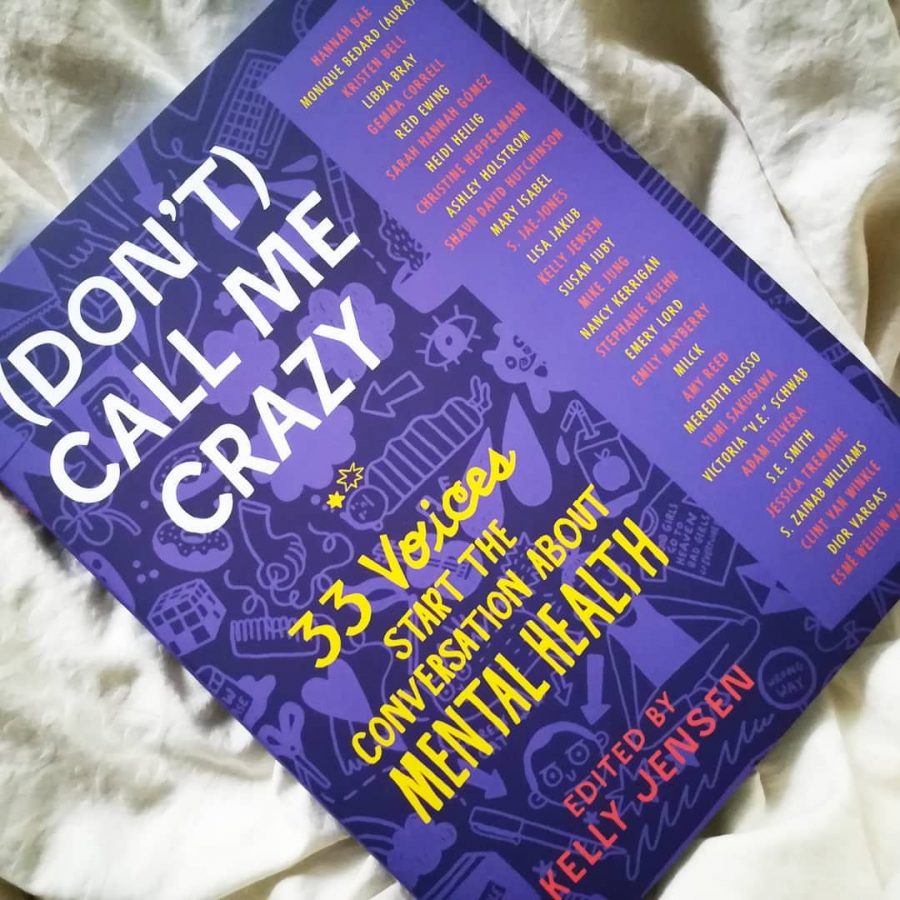Jefferson alumni and writer Hannah Bae shares experiences with students
Hannah Bae’s essay, “Survivor,” features in the above book.
November 28, 2018
Hannah Bae, a 2003 Jefferson graduate, discussed her struggles battling the pressures of Jefferson combined with family issues stemming from mental health problems, as detailed in her essay, “Survival Mode.” The event took place both A and B blocks on Wednesday, November 28th.
Bae’s essay can be found in a collection of perspectives on mental health titled, “Don’t Call me Crazy: 33 Voices to Start the Conversation on Mental Health,” which was published early last month.
“I’m so proud of the diversity of the range of contributors. There are people who are actors, public speakers, athletes, activists, and musical artists. And I’m so proud to be just one of many strong voices,” Bae said.
Through sharing her experiences, Bae provided an opportunity for Jefferson students to expand their knowledge of issues currently prevalent in the Jefferson community.
“[This event is important] because of the renewed emphasis on mental health today and the importance of mental health—people taking good care of themselves, not just physically, but mentally—and I think Hannah has a very powerful message that she can deliver to the TJ community,” Jefferson librarian Anne Applin, organizer of the event, said.
Reading from her essay, Bae shared her experiences growing up with a mother with paranoid schizophrenia.
“Sometimes, she’d confront dad, waving a heavy wooden coat hanger in his face. Once, when I intervened, she turned on me until I locked myself in the bathroom to call 911,” Bae said.
Her mother’s mental illness combined with her dad’s anger management issues resulted in a chaotic household, as described by Bae.
“It became an exasperating painful routine. I’d be downstairs in the study, stressing over a paper on the old desktop computer, chatting online, or struggling to make sense of precalculus. Then the screaming would start.”
As years passed, Bae used high school as an escape.
“For all the hyper competitive frenzy of TJ, it was also a community of supportive generous and intelligent teachers, guidance counselors, students, and parents. School was an oasis away from my family.”
Like many students, Bae became involved in numerous time-intensive activities, including Model UN, crew, and student government. But she did so with the goal of staying away from home as much as possible and forgetting the family issues.
“Because I was out of the house so much, I was really good at just compartmentalizing. Like once I get to school, I forget about all the home stuff. And then when I get home, I just like throw my stuff down, do my homework, don’t worry about what’s going on as best as I could,” Bae said.
At school, Bae told few about her home life, leaving little clues for her peers to realize the family issues that plagued her.
“I felt like there was so much shame around admitting that anything was different from everyone around me. In Korean culture, and a lot of Asian cultures as well, there’s this concept of saving face because you want to make sure that you’re presenting this very respectable image to the rest of society,” Bae said.
However, the chaos at home left Bae with a low B+ average, and by keeping the violence at home a secret, she was simply perceived as a bad student.
“In senior superlatives, I was actually voted least likely to graduate from college in my class,” Bae said.
Only after Bae graduated from the University of Miami, earned a stable job as a journalist, and severed ties with her family for stability, did she reach out to a professional to openly talk to.
“I started seeing a therapist who’s Korean American, and it has been hugely helpful in talking to someone who has cultural understanding of what my parents have been through, what I have been through, and to be able to tell me what is normal, what is not normal, and what is part of Korean society,” Bae said.
Consequently, throughout her talk, Bae consistently stressed the importance of realizing that opening up to other people is not something to be embarrassed about.
“I think that I would tell myself that it’s okay to confide in trusted adults,” Bae said when asked what advice she would give to her 15 year-old self.
As for current Jefferson students, hearing Bae’s experiences as a survivor of family mental illness problems helped them realize the impact of mental issues.
“I had known, myself, that there are many Asian parents who are very demanding and strict, but I never knew it could reach the extent where Hannah talked about, where a home is somewhere she wanted to get out of, instead of a place in comfort,” junior Joseph Lee said. “Now I’m more able to understand the extent to which not only mental health for stress is important, but also how that might play a role in family relationships.”
Bae’s success even as she struggled with family issues and academic performance resonated with many students as well.
“I think [the discussion] helped me realize that I do have a safety net, and it helped me realized that it’s not the end of the world if I’m bad at something; it won’t necessarily ruin my life,” freshman Jennifer Hunsinger said.
Despite the emotional, mental, and physical pain caused by her family issues, Bae recognizes the need to share the stories she bottled up for so long.
“My career in journalism had been all about telling other people’s stories, and I didn’t feel ready to confront my story. And it’s still really hard to do,” Bae said. “But I feel like if the pressured environment of TJ taught me how to be tough and resilient, adult life has taught me how to be soft and empathetic. And I feel like being able to write about my family has meant forgiving, not forgetting.






